Leadership Analysis: John Ilhan and Early Childhood Relevance
VerifiedAdded on 2020/06/04
|9
|2897
|84
Report
AI Summary
This report delves into the multifaceted aspects of leadership, examining the skills, qualities, and abilities essential for effective leadership. The report uses John Ilhan, a successful Australian entrepreneur, as a case study to illustrate leadership principles, focusing on his focus, confidence, inspirational qualities, motivational skills, innovation, decisiveness, authenticity, positivity, communication, and accountability. It then explores the relevance of early childhood experiences in shaping leadership capabilities and discusses the application of human resource policies in children's services. The report also includes a self-analysis of the author's leadership style, philosophy, and skills, drawing on personal experiences and examples to illustrate leadership development. The analysis covers leadership styles, current skills, habits of mind, and influential leaders. The report concludes by emphasizing the importance of leadership in early childhood education and the development of future leaders.
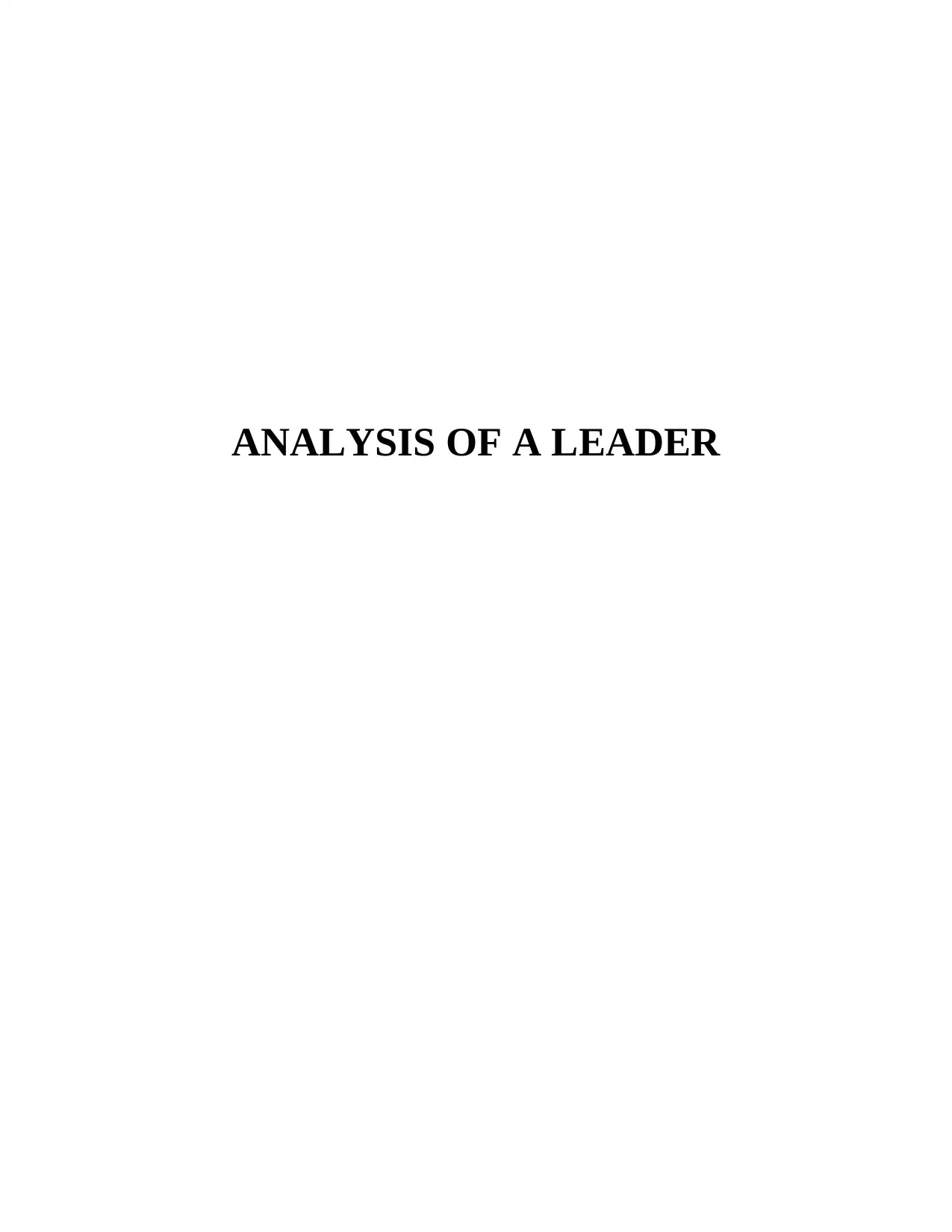
ANALYSIS OF A LEADER
Paraphrase This Document
Need a fresh take? Get an instant paraphrase of this document with our AI Paraphraser
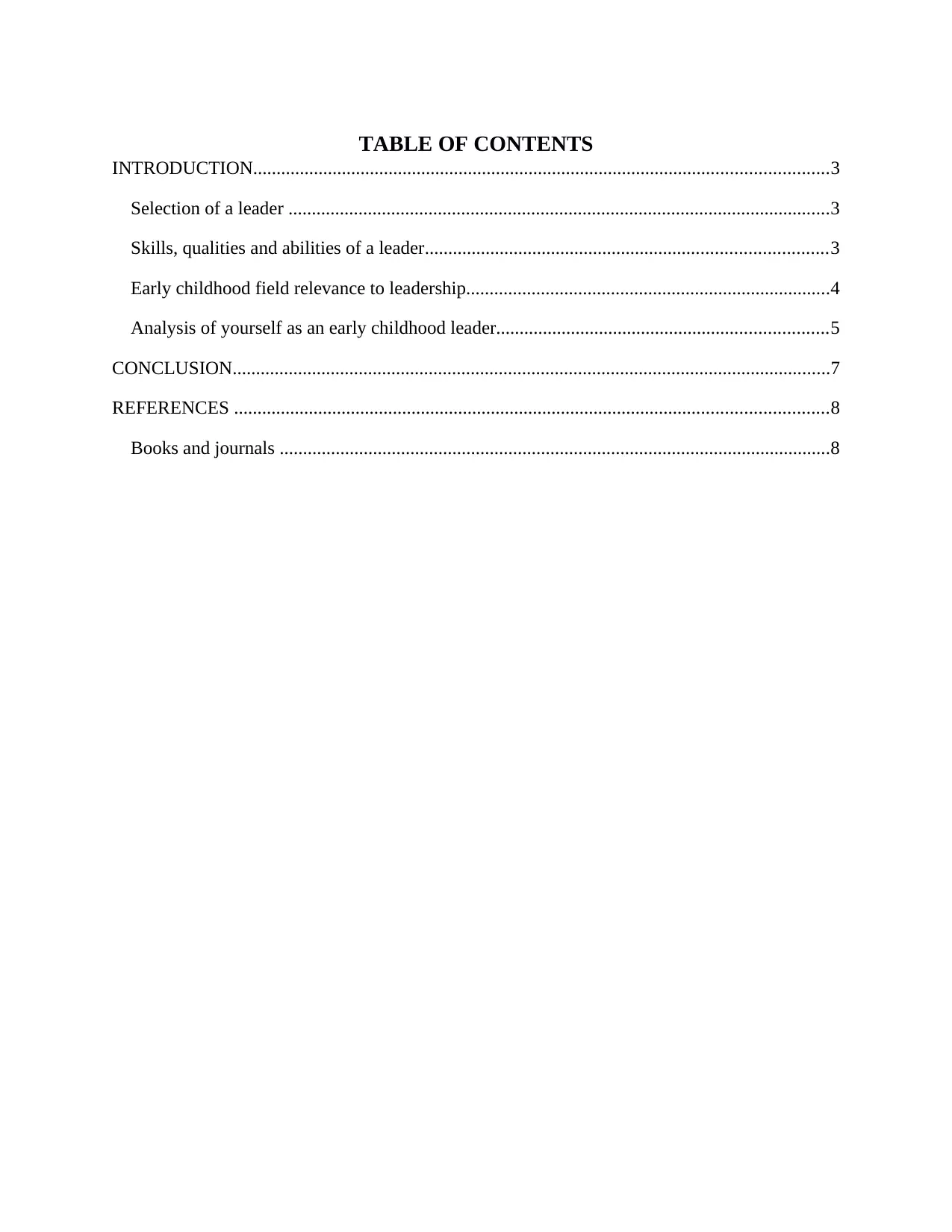
TABLE OF CONTENTS
INTRODUCTION...........................................................................................................................3
Selection of a leader ....................................................................................................................3
Skills, qualities and abilities of a leader......................................................................................3
Early childhood field relevance to leadership..............................................................................4
Analysis of yourself as an early childhood leader.......................................................................5
CONCLUSION................................................................................................................................7
REFERENCES ...............................................................................................................................8
Books and journals ......................................................................................................................8
INTRODUCTION...........................................................................................................................3
Selection of a leader ....................................................................................................................3
Skills, qualities and abilities of a leader......................................................................................3
Early childhood field relevance to leadership..............................................................................4
Analysis of yourself as an early childhood leader.......................................................................5
CONCLUSION................................................................................................................................7
REFERENCES ...............................................................................................................................8
Books and journals ......................................................................................................................8
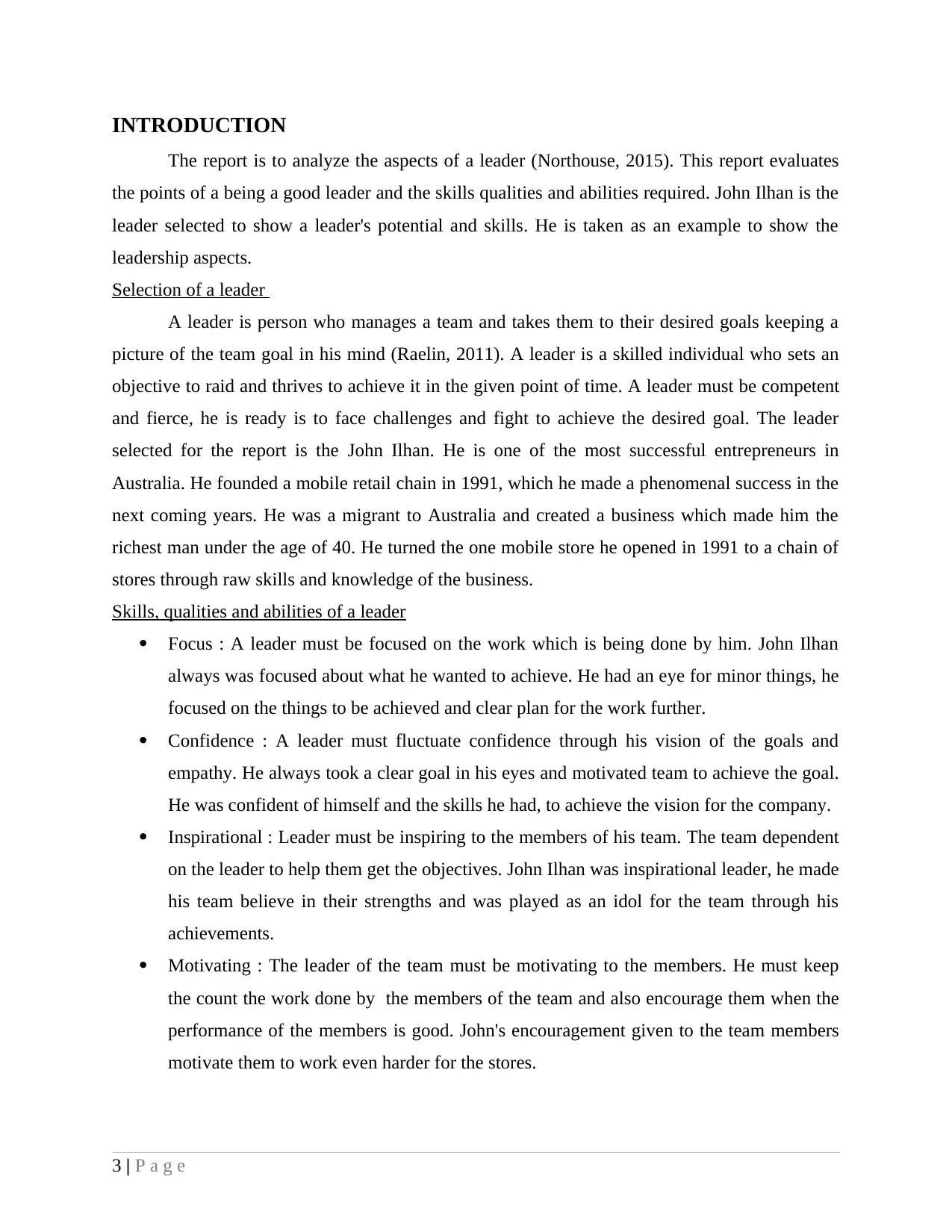
INTRODUCTION
The report is to analyze the aspects of a leader (Northouse, 2015). This report evaluates
the points of a being a good leader and the skills qualities and abilities required. John Ilhan is the
leader selected to show a leader's potential and skills. He is taken as an example to show the
leadership aspects.
Selection of a leader
A leader is person who manages a team and takes them to their desired goals keeping a
picture of the team goal in his mind (Raelin, 2011). A leader is a skilled individual who sets an
objective to raid and thrives to achieve it in the given point of time. A leader must be competent
and fierce, he is ready is to face challenges and fight to achieve the desired goal. The leader
selected for the report is the John Ilhan. He is one of the most successful entrepreneurs in
Australia. He founded a mobile retail chain in 1991, which he made a phenomenal success in the
next coming years. He was a migrant to Australia and created a business which made him the
richest man under the age of 40. He turned the one mobile store he opened in 1991 to a chain of
stores through raw skills and knowledge of the business.
Skills, qualities and abilities of a leader
Focus : A leader must be focused on the work which is being done by him. John Ilhan
always was focused about what he wanted to achieve. He had an eye for minor things, he
focused on the things to be achieved and clear plan for the work further.
Confidence : A leader must fluctuate confidence through his vision of the goals and
empathy. He always took a clear goal in his eyes and motivated team to achieve the goal.
He was confident of himself and the skills he had, to achieve the vision for the company.
Inspirational : Leader must be inspiring to the members of his team. The team dependent
on the leader to help them get the objectives. John Ilhan was inspirational leader, he made
his team believe in their strengths and was played as an idol for the team through his
achievements.
Motivating : The leader of the team must be motivating to the members. He must keep
the count the work done by the members of the team and also encourage them when the
performance of the members is good. John's encouragement given to the team members
motivate them to work even harder for the stores.
3 | P a g e
The report is to analyze the aspects of a leader (Northouse, 2015). This report evaluates
the points of a being a good leader and the skills qualities and abilities required. John Ilhan is the
leader selected to show a leader's potential and skills. He is taken as an example to show the
leadership aspects.
Selection of a leader
A leader is person who manages a team and takes them to their desired goals keeping a
picture of the team goal in his mind (Raelin, 2011). A leader is a skilled individual who sets an
objective to raid and thrives to achieve it in the given point of time. A leader must be competent
and fierce, he is ready is to face challenges and fight to achieve the desired goal. The leader
selected for the report is the John Ilhan. He is one of the most successful entrepreneurs in
Australia. He founded a mobile retail chain in 1991, which he made a phenomenal success in the
next coming years. He was a migrant to Australia and created a business which made him the
richest man under the age of 40. He turned the one mobile store he opened in 1991 to a chain of
stores through raw skills and knowledge of the business.
Skills, qualities and abilities of a leader
Focus : A leader must be focused on the work which is being done by him. John Ilhan
always was focused about what he wanted to achieve. He had an eye for minor things, he
focused on the things to be achieved and clear plan for the work further.
Confidence : A leader must fluctuate confidence through his vision of the goals and
empathy. He always took a clear goal in his eyes and motivated team to achieve the goal.
He was confident of himself and the skills he had, to achieve the vision for the company.
Inspirational : Leader must be inspiring to the members of his team. The team dependent
on the leader to help them get the objectives. John Ilhan was inspirational leader, he made
his team believe in their strengths and was played as an idol for the team through his
achievements.
Motivating : The leader of the team must be motivating to the members. He must keep
the count the work done by the members of the team and also encourage them when the
performance of the members is good. John's encouragement given to the team members
motivate them to work even harder for the stores.
3 | P a g e
⊘ This is a preview!⊘
Do you want full access?
Subscribe today to unlock all pages.

Trusted by 1+ million students worldwide
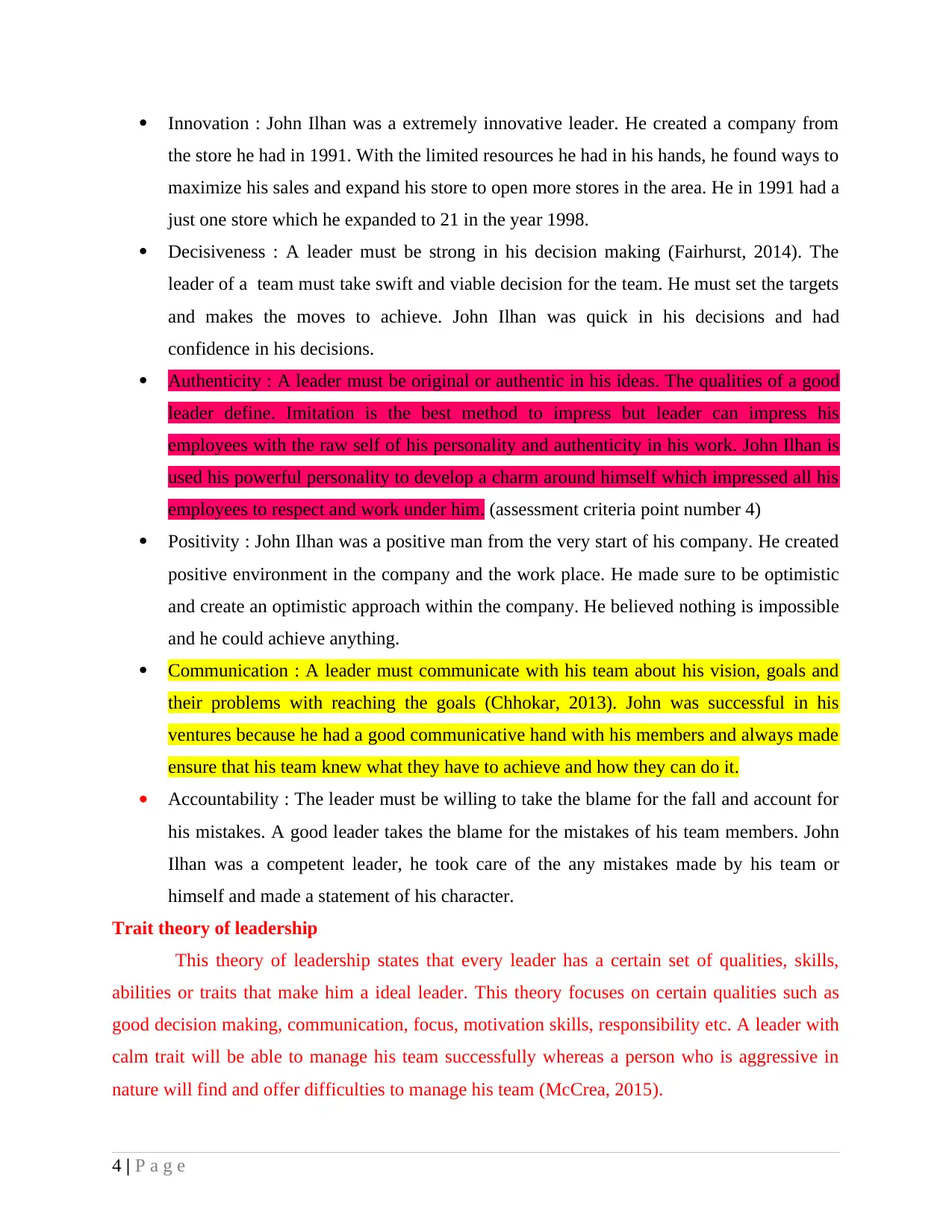
Innovation : John Ilhan was a extremely innovative leader. He created a company from
the store he had in 1991. With the limited resources he had in his hands, he found ways to
maximize his sales and expand his store to open more stores in the area. He in 1991 had a
just one store which he expanded to 21 in the year 1998.
Decisiveness : A leader must be strong in his decision making (Fairhurst, 2014). The
leader of a team must take swift and viable decision for the team. He must set the targets
and makes the moves to achieve. John Ilhan was quick in his decisions and had
confidence in his decisions.
Authenticity : A leader must be original or authentic in his ideas. The qualities of a good
leader define. Imitation is the best method to impress but leader can impress his
employees with the raw self of his personality and authenticity in his work. John Ilhan is
used his powerful personality to develop a charm around himself which impressed all his
employees to respect and work under him. (assessment criteria point number 4)
Positivity : John Ilhan was a positive man from the very start of his company. He created
positive environment in the company and the work place. He made sure to be optimistic
and create an optimistic approach within the company. He believed nothing is impossible
and he could achieve anything.
Communication : A leader must communicate with his team about his vision, goals and
their problems with reaching the goals (Chhokar, 2013). John was successful in his
ventures because he had a good communicative hand with his members and always made
ensure that his team knew what they have to achieve and how they can do it.
Accountability : The leader must be willing to take the blame for the fall and account for
his mistakes. A good leader takes the blame for the mistakes of his team members. John
Ilhan was a competent leader, he took care of the any mistakes made by his team or
himself and made a statement of his character.
Trait theory of leadership
This theory of leadership states that every leader has a certain set of qualities, skills,
abilities or traits that make him a ideal leader. This theory focuses on certain qualities such as
good decision making, communication, focus, motivation skills, responsibility etc. A leader with
calm trait will be able to manage his team successfully whereas a person who is aggressive in
nature will find and offer difficulties to manage his team (McCrea, 2015).
4 | P a g e
the store he had in 1991. With the limited resources he had in his hands, he found ways to
maximize his sales and expand his store to open more stores in the area. He in 1991 had a
just one store which he expanded to 21 in the year 1998.
Decisiveness : A leader must be strong in his decision making (Fairhurst, 2014). The
leader of a team must take swift and viable decision for the team. He must set the targets
and makes the moves to achieve. John Ilhan was quick in his decisions and had
confidence in his decisions.
Authenticity : A leader must be original or authentic in his ideas. The qualities of a good
leader define. Imitation is the best method to impress but leader can impress his
employees with the raw self of his personality and authenticity in his work. John Ilhan is
used his powerful personality to develop a charm around himself which impressed all his
employees to respect and work under him. (assessment criteria point number 4)
Positivity : John Ilhan was a positive man from the very start of his company. He created
positive environment in the company and the work place. He made sure to be optimistic
and create an optimistic approach within the company. He believed nothing is impossible
and he could achieve anything.
Communication : A leader must communicate with his team about his vision, goals and
their problems with reaching the goals (Chhokar, 2013). John was successful in his
ventures because he had a good communicative hand with his members and always made
ensure that his team knew what they have to achieve and how they can do it.
Accountability : The leader must be willing to take the blame for the fall and account for
his mistakes. A good leader takes the blame for the mistakes of his team members. John
Ilhan was a competent leader, he took care of the any mistakes made by his team or
himself and made a statement of his character.
Trait theory of leadership
This theory of leadership states that every leader has a certain set of qualities, skills,
abilities or traits that make him a ideal leader. This theory focuses on certain qualities such as
good decision making, communication, focus, motivation skills, responsibility etc. A leader with
calm trait will be able to manage his team successfully whereas a person who is aggressive in
nature will find and offer difficulties to manage his team (McCrea, 2015).
4 | P a g e
Paraphrase This Document
Need a fresh take? Get an instant paraphrase of this document with our AI Paraphraser
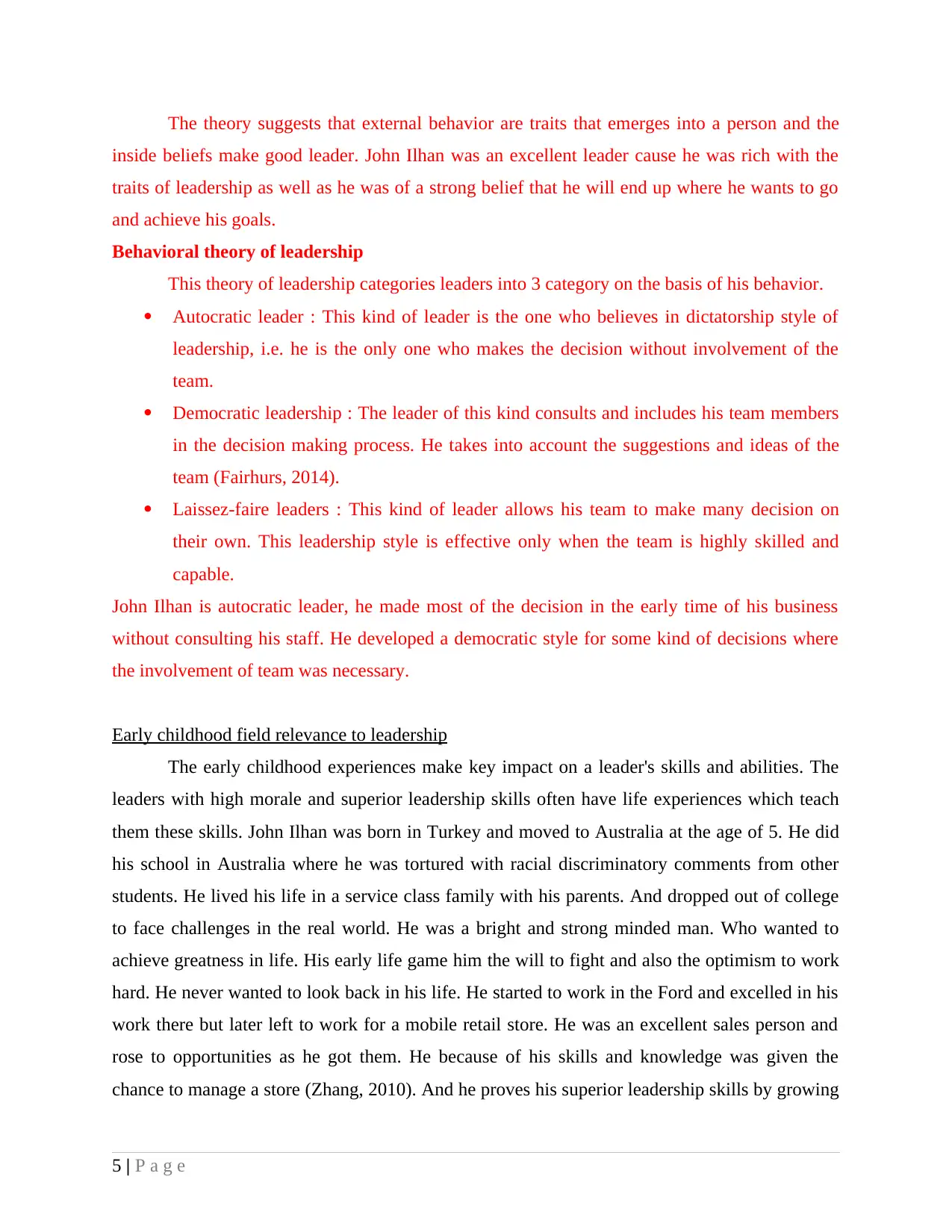
The theory suggests that external behavior are traits that emerges into a person and the
inside beliefs make good leader. John Ilhan was an excellent leader cause he was rich with the
traits of leadership as well as he was of a strong belief that he will end up where he wants to go
and achieve his goals.
Behavioral theory of leadership
This theory of leadership categories leaders into 3 category on the basis of his behavior.
Autocratic leader : This kind of leader is the one who believes in dictatorship style of
leadership, i.e. he is the only one who makes the decision without involvement of the
team.
Democratic leadership : The leader of this kind consults and includes his team members
in the decision making process. He takes into account the suggestions and ideas of the
team (Fairhurs, 2014).
Laissez-faire leaders : This kind of leader allows his team to make many decision on
their own. This leadership style is effective only when the team is highly skilled and
capable.
John Ilhan is autocratic leader, he made most of the decision in the early time of his business
without consulting his staff. He developed a democratic style for some kind of decisions where
the involvement of team was necessary.
Early childhood field relevance to leadership
The early childhood experiences make key impact on a leader's skills and abilities. The
leaders with high morale and superior leadership skills often have life experiences which teach
them these skills. John Ilhan was born in Turkey and moved to Australia at the age of 5. He did
his school in Australia where he was tortured with racial discriminatory comments from other
students. He lived his life in a service class family with his parents. And dropped out of college
to face challenges in the real world. He was a bright and strong minded man. Who wanted to
achieve greatness in life. His early life game him the will to fight and also the optimism to work
hard. He never wanted to look back in his life. He started to work in the Ford and excelled in his
work there but later left to work for a mobile retail store. He was an excellent sales person and
rose to opportunities as he got them. He because of his skills and knowledge was given the
chance to manage a store (Zhang, 2010). And he proves his superior leadership skills by growing
5 | P a g e
inside beliefs make good leader. John Ilhan was an excellent leader cause he was rich with the
traits of leadership as well as he was of a strong belief that he will end up where he wants to go
and achieve his goals.
Behavioral theory of leadership
This theory of leadership categories leaders into 3 category on the basis of his behavior.
Autocratic leader : This kind of leader is the one who believes in dictatorship style of
leadership, i.e. he is the only one who makes the decision without involvement of the
team.
Democratic leadership : The leader of this kind consults and includes his team members
in the decision making process. He takes into account the suggestions and ideas of the
team (Fairhurs, 2014).
Laissez-faire leaders : This kind of leader allows his team to make many decision on
their own. This leadership style is effective only when the team is highly skilled and
capable.
John Ilhan is autocratic leader, he made most of the decision in the early time of his business
without consulting his staff. He developed a democratic style for some kind of decisions where
the involvement of team was necessary.
Early childhood field relevance to leadership
The early childhood experiences make key impact on a leader's skills and abilities. The
leaders with high morale and superior leadership skills often have life experiences which teach
them these skills. John Ilhan was born in Turkey and moved to Australia at the age of 5. He did
his school in Australia where he was tortured with racial discriminatory comments from other
students. He lived his life in a service class family with his parents. And dropped out of college
to face challenges in the real world. He was a bright and strong minded man. Who wanted to
achieve greatness in life. His early life game him the will to fight and also the optimism to work
hard. He never wanted to look back in his life. He started to work in the Ford and excelled in his
work there but later left to work for a mobile retail store. He was an excellent sales person and
rose to opportunities as he got them. He because of his skills and knowledge was given the
chance to manage a store (Zhang, 2010). And he proves his superior leadership skills by growing
5 | P a g e
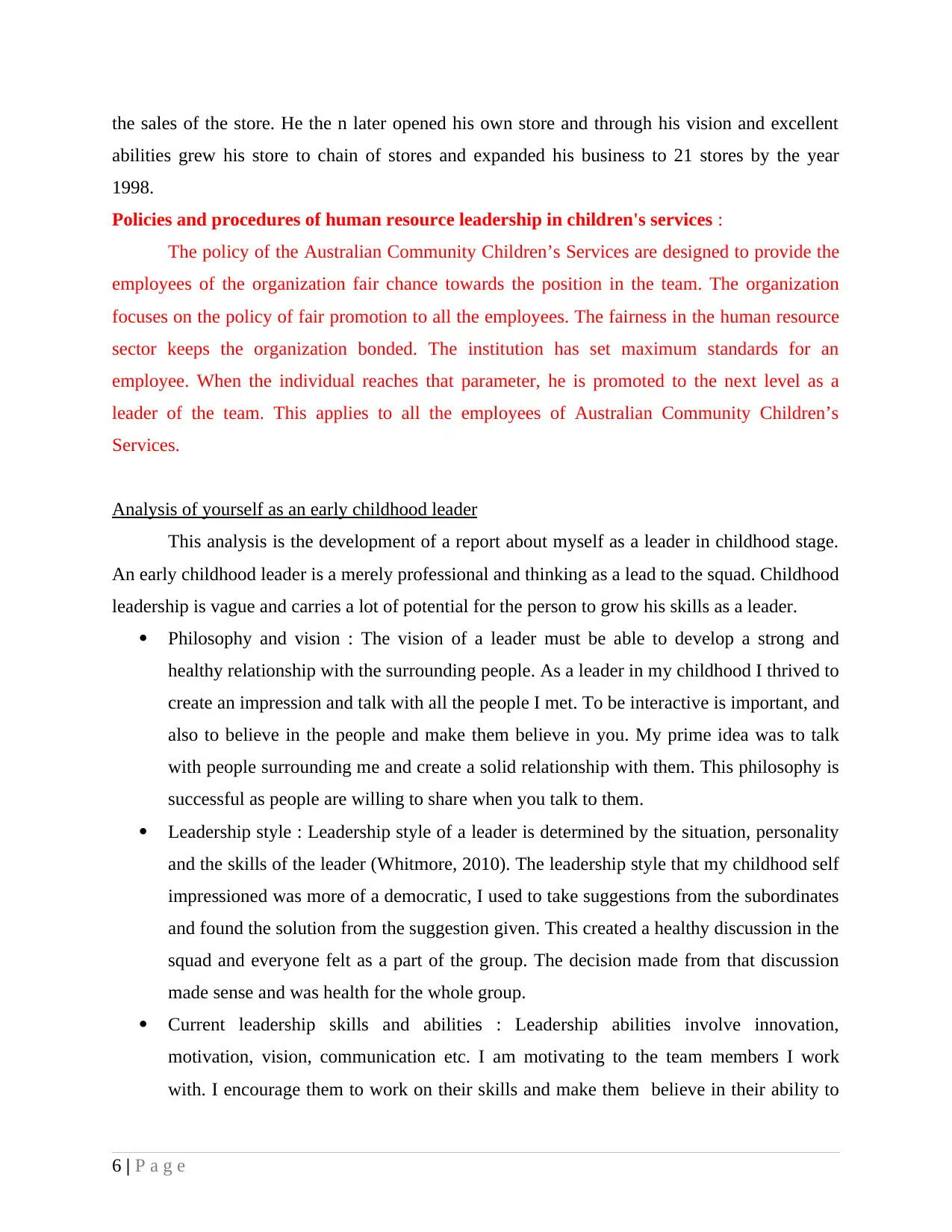
the sales of the store. He the n later opened his own store and through his vision and excellent
abilities grew his store to chain of stores and expanded his business to 21 stores by the year
1998.
Policies and procedures of human resource leadership in children's services :
The policy of the Australian Community Children’s Services are designed to provide the
employees of the organization fair chance towards the position in the team. The organization
focuses on the policy of fair promotion to all the employees. The fairness in the human resource
sector keeps the organization bonded. The institution has set maximum standards for an
employee. When the individual reaches that parameter, he is promoted to the next level as a
leader of the team. This applies to all the employees of Australian Community Children’s
Services.
Analysis of yourself as an early childhood leader
This analysis is the development of a report about myself as a leader in childhood stage.
An early childhood leader is a merely professional and thinking as a lead to the squad. Childhood
leadership is vague and carries a lot of potential for the person to grow his skills as a leader.
Philosophy and vision : The vision of a leader must be able to develop a strong and
healthy relationship with the surrounding people. As a leader in my childhood I thrived to
create an impression and talk with all the people I met. To be interactive is important, and
also to believe in the people and make them believe in you. My prime idea was to talk
with people surrounding me and create a solid relationship with them. This philosophy is
successful as people are willing to share when you talk to them.
Leadership style : Leadership style of a leader is determined by the situation, personality
and the skills of the leader (Whitmore, 2010). The leadership style that my childhood self
impressioned was more of a democratic, I used to take suggestions from the subordinates
and found the solution from the suggestion given. This created a healthy discussion in the
squad and everyone felt as a part of the group. The decision made from that discussion
made sense and was health for the whole group.
Current leadership skills and abilities : Leadership abilities involve innovation,
motivation, vision, communication etc. I am motivating to the team members I work
with. I encourage them to work on their skills and make them believe in their ability to
6 | P a g e
abilities grew his store to chain of stores and expanded his business to 21 stores by the year
1998.
Policies and procedures of human resource leadership in children's services :
The policy of the Australian Community Children’s Services are designed to provide the
employees of the organization fair chance towards the position in the team. The organization
focuses on the policy of fair promotion to all the employees. The fairness in the human resource
sector keeps the organization bonded. The institution has set maximum standards for an
employee. When the individual reaches that parameter, he is promoted to the next level as a
leader of the team. This applies to all the employees of Australian Community Children’s
Services.
Analysis of yourself as an early childhood leader
This analysis is the development of a report about myself as a leader in childhood stage.
An early childhood leader is a merely professional and thinking as a lead to the squad. Childhood
leadership is vague and carries a lot of potential for the person to grow his skills as a leader.
Philosophy and vision : The vision of a leader must be able to develop a strong and
healthy relationship with the surrounding people. As a leader in my childhood I thrived to
create an impression and talk with all the people I met. To be interactive is important, and
also to believe in the people and make them believe in you. My prime idea was to talk
with people surrounding me and create a solid relationship with them. This philosophy is
successful as people are willing to share when you talk to them.
Leadership style : Leadership style of a leader is determined by the situation, personality
and the skills of the leader (Whitmore, 2010). The leadership style that my childhood self
impressioned was more of a democratic, I used to take suggestions from the subordinates
and found the solution from the suggestion given. This created a healthy discussion in the
squad and everyone felt as a part of the group. The decision made from that discussion
made sense and was health for the whole group.
Current leadership skills and abilities : Leadership abilities involve innovation,
motivation, vision, communication etc. I am motivating to the team members I work
with. I encourage them to work on their skills and make them believe in their ability to
6 | P a g e
⊘ This is a preview!⊘
Do you want full access?
Subscribe today to unlock all pages.

Trusted by 1+ million students worldwide
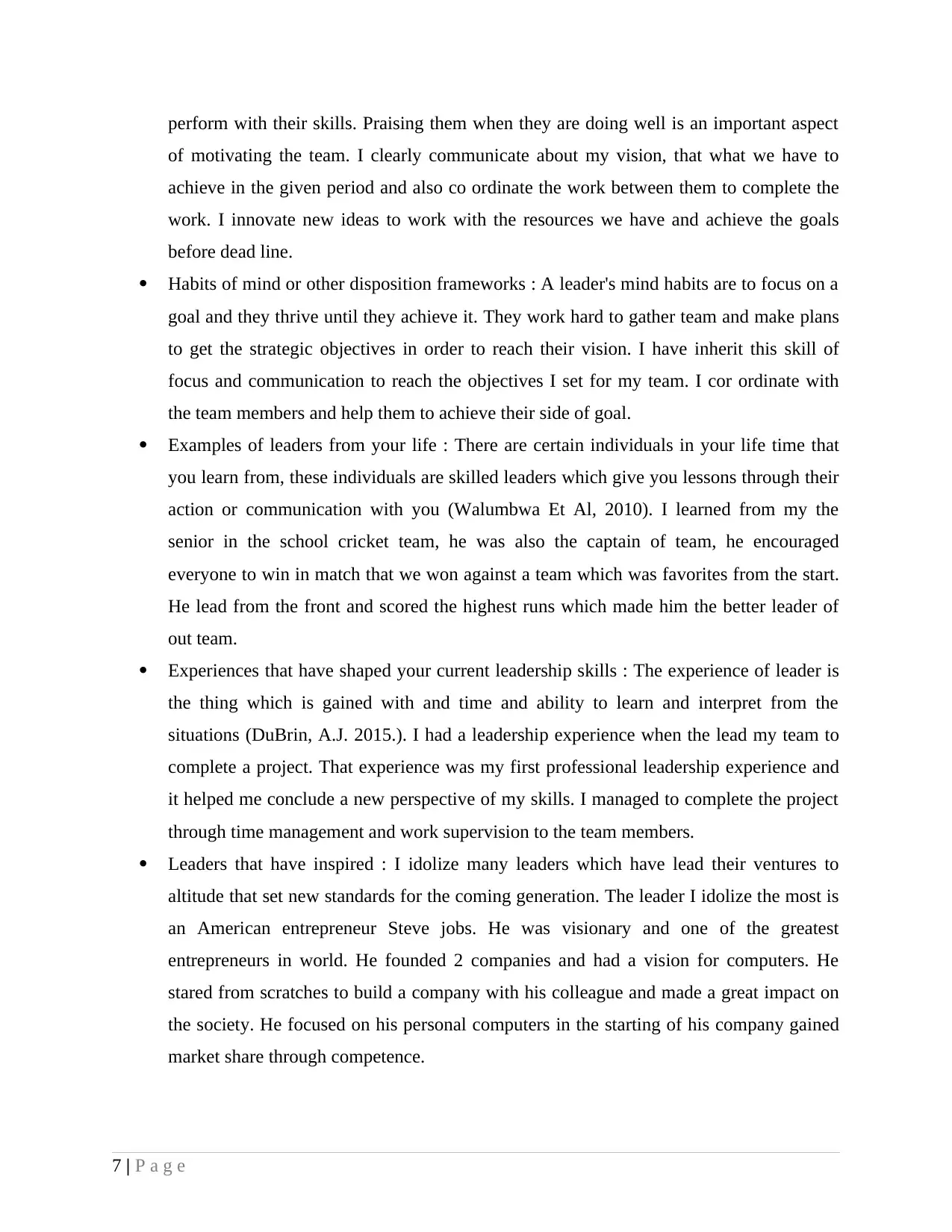
perform with their skills. Praising them when they are doing well is an important aspect
of motivating the team. I clearly communicate about my vision, that what we have to
achieve in the given period and also co ordinate the work between them to complete the
work. I innovate new ideas to work with the resources we have and achieve the goals
before dead line.
Habits of mind or other disposition frameworks : A leader's mind habits are to focus on a
goal and they thrive until they achieve it. They work hard to gather team and make plans
to get the strategic objectives in order to reach their vision. I have inherit this skill of
focus and communication to reach the objectives I set for my team. I cor ordinate with
the team members and help them to achieve their side of goal.
Examples of leaders from your life : There are certain individuals in your life time that
you learn from, these individuals are skilled leaders which give you lessons through their
action or communication with you (Walumbwa Et Al, 2010). I learned from my the
senior in the school cricket team, he was also the captain of team, he encouraged
everyone to win in match that we won against a team which was favorites from the start.
He lead from the front and scored the highest runs which made him the better leader of
out team.
Experiences that have shaped your current leadership skills : The experience of leader is
the thing which is gained with and time and ability to learn and interpret from the
situations (DuBrin, A.J. 2015.). I had a leadership experience when the lead my team to
complete a project. That experience was my first professional leadership experience and
it helped me conclude a new perspective of my skills. I managed to complete the project
through time management and work supervision to the team members.
Leaders that have inspired : I idolize many leaders which have lead their ventures to
altitude that set new standards for the coming generation. The leader I idolize the most is
an American entrepreneur Steve jobs. He was visionary and one of the greatest
entrepreneurs in world. He founded 2 companies and had a vision for computers. He
stared from scratches to build a company with his colleague and made a great impact on
the society. He focused on his personal computers in the starting of his company gained
market share through competence.
7 | P a g e
of motivating the team. I clearly communicate about my vision, that what we have to
achieve in the given period and also co ordinate the work between them to complete the
work. I innovate new ideas to work with the resources we have and achieve the goals
before dead line.
Habits of mind or other disposition frameworks : A leader's mind habits are to focus on a
goal and they thrive until they achieve it. They work hard to gather team and make plans
to get the strategic objectives in order to reach their vision. I have inherit this skill of
focus and communication to reach the objectives I set for my team. I cor ordinate with
the team members and help them to achieve their side of goal.
Examples of leaders from your life : There are certain individuals in your life time that
you learn from, these individuals are skilled leaders which give you lessons through their
action or communication with you (Walumbwa Et Al, 2010). I learned from my the
senior in the school cricket team, he was also the captain of team, he encouraged
everyone to win in match that we won against a team which was favorites from the start.
He lead from the front and scored the highest runs which made him the better leader of
out team.
Experiences that have shaped your current leadership skills : The experience of leader is
the thing which is gained with and time and ability to learn and interpret from the
situations (DuBrin, A.J. 2015.). I had a leadership experience when the lead my team to
complete a project. That experience was my first professional leadership experience and
it helped me conclude a new perspective of my skills. I managed to complete the project
through time management and work supervision to the team members.
Leaders that have inspired : I idolize many leaders which have lead their ventures to
altitude that set new standards for the coming generation. The leader I idolize the most is
an American entrepreneur Steve jobs. He was visionary and one of the greatest
entrepreneurs in world. He founded 2 companies and had a vision for computers. He
stared from scratches to build a company with his colleague and made a great impact on
the society. He focused on his personal computers in the starting of his company gained
market share through competence.
7 | P a g e
Paraphrase This Document
Need a fresh take? Get an instant paraphrase of this document with our AI Paraphraser
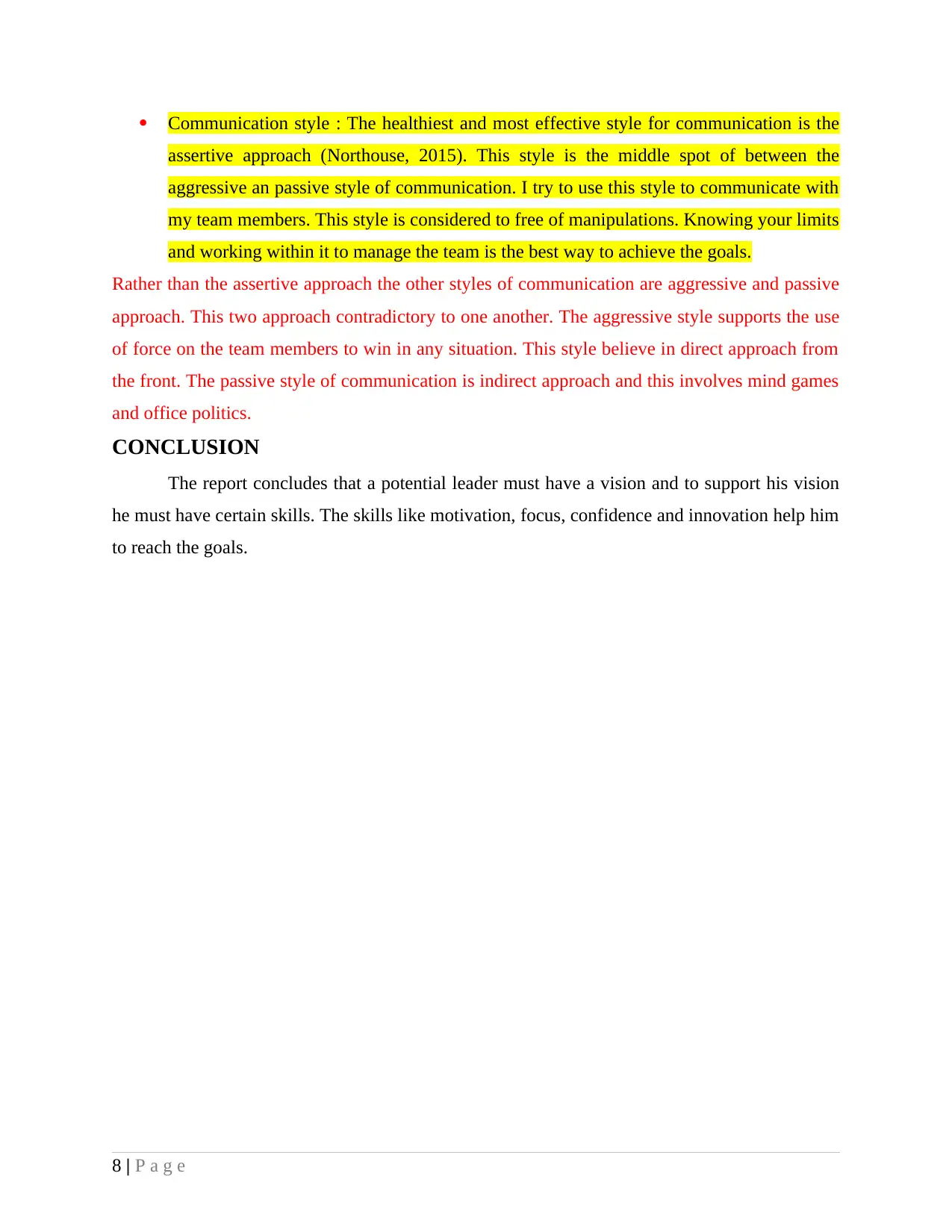
Communication style : The healthiest and most effective style for communication is the
assertive approach (Northouse, 2015). This style is the middle spot of between the
aggressive an passive style of communication. I try to use this style to communicate with
my team members. This style is considered to free of manipulations. Knowing your limits
and working within it to manage the team is the best way to achieve the goals.
Rather than the assertive approach the other styles of communication are aggressive and passive
approach. This two approach contradictory to one another. The aggressive style supports the use
of force on the team members to win in any situation. This style believe in direct approach from
the front. The passive style of communication is indirect approach and this involves mind games
and office politics.
CONCLUSION
The report concludes that a potential leader must have a vision and to support his vision
he must have certain skills. The skills like motivation, focus, confidence and innovation help him
to reach the goals.
8 | P a g e
assertive approach (Northouse, 2015). This style is the middle spot of between the
aggressive an passive style of communication. I try to use this style to communicate with
my team members. This style is considered to free of manipulations. Knowing your limits
and working within it to manage the team is the best way to achieve the goals.
Rather than the assertive approach the other styles of communication are aggressive and passive
approach. This two approach contradictory to one another. The aggressive style supports the use
of force on the team members to win in any situation. This style believe in direct approach from
the front. The passive style of communication is indirect approach and this involves mind games
and office politics.
CONCLUSION
The report concludes that a potential leader must have a vision and to support his vision
he must have certain skills. The skills like motivation, focus, confidence and innovation help him
to reach the goals.
8 | P a g e
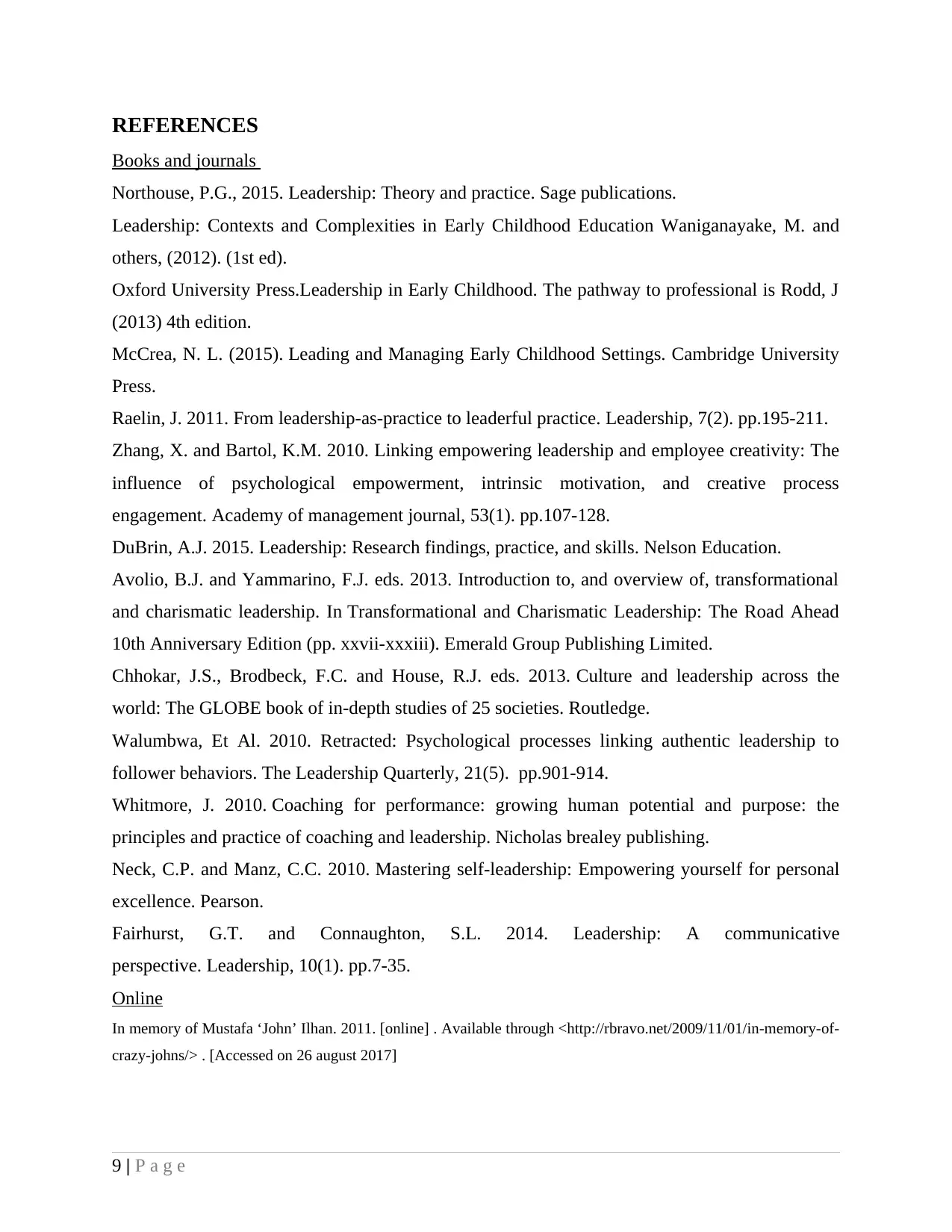
REFERENCES
Books and journals
Northouse, P.G., 2015. Leadership: Theory and practice. Sage publications.
Leadership: Contexts and Complexities in Early Childhood Education Waniganayake, M. and
others, (2012). (1st ed).
Oxford University Press.Leadership in Early Childhood. The pathway to professional is Rodd, J
(2013) 4th edition.
McCrea, N. L. (2015). Leading and Managing Early Childhood Settings. Cambridge University
Press.
Raelin, J. 2011. From leadership-as-practice to leaderful practice. Leadership, 7(2). pp.195-211.
Zhang, X. and Bartol, K.M. 2010. Linking empowering leadership and employee creativity: The
influence of psychological empowerment, intrinsic motivation, and creative process
engagement. Academy of management journal, 53(1). pp.107-128.
DuBrin, A.J. 2015. Leadership: Research findings, practice, and skills. Nelson Education.
Avolio, B.J. and Yammarino, F.J. eds. 2013. Introduction to, and overview of, transformational
and charismatic leadership. In Transformational and Charismatic Leadership: The Road Ahead
10th Anniversary Edition (pp. xxvii-xxxiii). Emerald Group Publishing Limited.
Chhokar, J.S., Brodbeck, F.C. and House, R.J. eds. 2013. Culture and leadership across the
world: The GLOBE book of in-depth studies of 25 societies. Routledge.
Walumbwa, Et Al. 2010. Retracted: Psychological processes linking authentic leadership to
follower behaviors. The Leadership Quarterly, 21(5). pp.901-914.
Whitmore, J. 2010. Coaching for performance: growing human potential and purpose: the
principles and practice of coaching and leadership. Nicholas brealey publishing.
Neck, C.P. and Manz, C.C. 2010. Mastering self-leadership: Empowering yourself for personal
excellence. Pearson.
Fairhurst, G.T. and Connaughton, S.L. 2014. Leadership: A communicative
perspective. Leadership, 10(1). pp.7-35.
Online
In memory of Mustafa ‘John’ Ilhan. 2011. [online] . Available through <http://rbravo.net/2009/11/01/in-memory-of-
crazy-johns/> . [Accessed on 26 august 2017]
9 | P a g e
Books and journals
Northouse, P.G., 2015. Leadership: Theory and practice. Sage publications.
Leadership: Contexts and Complexities in Early Childhood Education Waniganayake, M. and
others, (2012). (1st ed).
Oxford University Press.Leadership in Early Childhood. The pathway to professional is Rodd, J
(2013) 4th edition.
McCrea, N. L. (2015). Leading and Managing Early Childhood Settings. Cambridge University
Press.
Raelin, J. 2011. From leadership-as-practice to leaderful practice. Leadership, 7(2). pp.195-211.
Zhang, X. and Bartol, K.M. 2010. Linking empowering leadership and employee creativity: The
influence of psychological empowerment, intrinsic motivation, and creative process
engagement. Academy of management journal, 53(1). pp.107-128.
DuBrin, A.J. 2015. Leadership: Research findings, practice, and skills. Nelson Education.
Avolio, B.J. and Yammarino, F.J. eds. 2013. Introduction to, and overview of, transformational
and charismatic leadership. In Transformational and Charismatic Leadership: The Road Ahead
10th Anniversary Edition (pp. xxvii-xxxiii). Emerald Group Publishing Limited.
Chhokar, J.S., Brodbeck, F.C. and House, R.J. eds. 2013. Culture and leadership across the
world: The GLOBE book of in-depth studies of 25 societies. Routledge.
Walumbwa, Et Al. 2010. Retracted: Psychological processes linking authentic leadership to
follower behaviors. The Leadership Quarterly, 21(5). pp.901-914.
Whitmore, J. 2010. Coaching for performance: growing human potential and purpose: the
principles and practice of coaching and leadership. Nicholas brealey publishing.
Neck, C.P. and Manz, C.C. 2010. Mastering self-leadership: Empowering yourself for personal
excellence. Pearson.
Fairhurst, G.T. and Connaughton, S.L. 2014. Leadership: A communicative
perspective. Leadership, 10(1). pp.7-35.
Online
In memory of Mustafa ‘John’ Ilhan. 2011. [online] . Available through <http://rbravo.net/2009/11/01/in-memory-of-
crazy-johns/> . [Accessed on 26 august 2017]
9 | P a g e
⊘ This is a preview!⊘
Do you want full access?
Subscribe today to unlock all pages.

Trusted by 1+ million students worldwide
1 out of 9
Related Documents
Your All-in-One AI-Powered Toolkit for Academic Success.
+13062052269
info@desklib.com
Available 24*7 on WhatsApp / Email
![[object Object]](/_next/static/media/star-bottom.7253800d.svg)
Unlock your academic potential
Copyright © 2020–2025 A2Z Services. All Rights Reserved. Developed and managed by ZUCOL.




